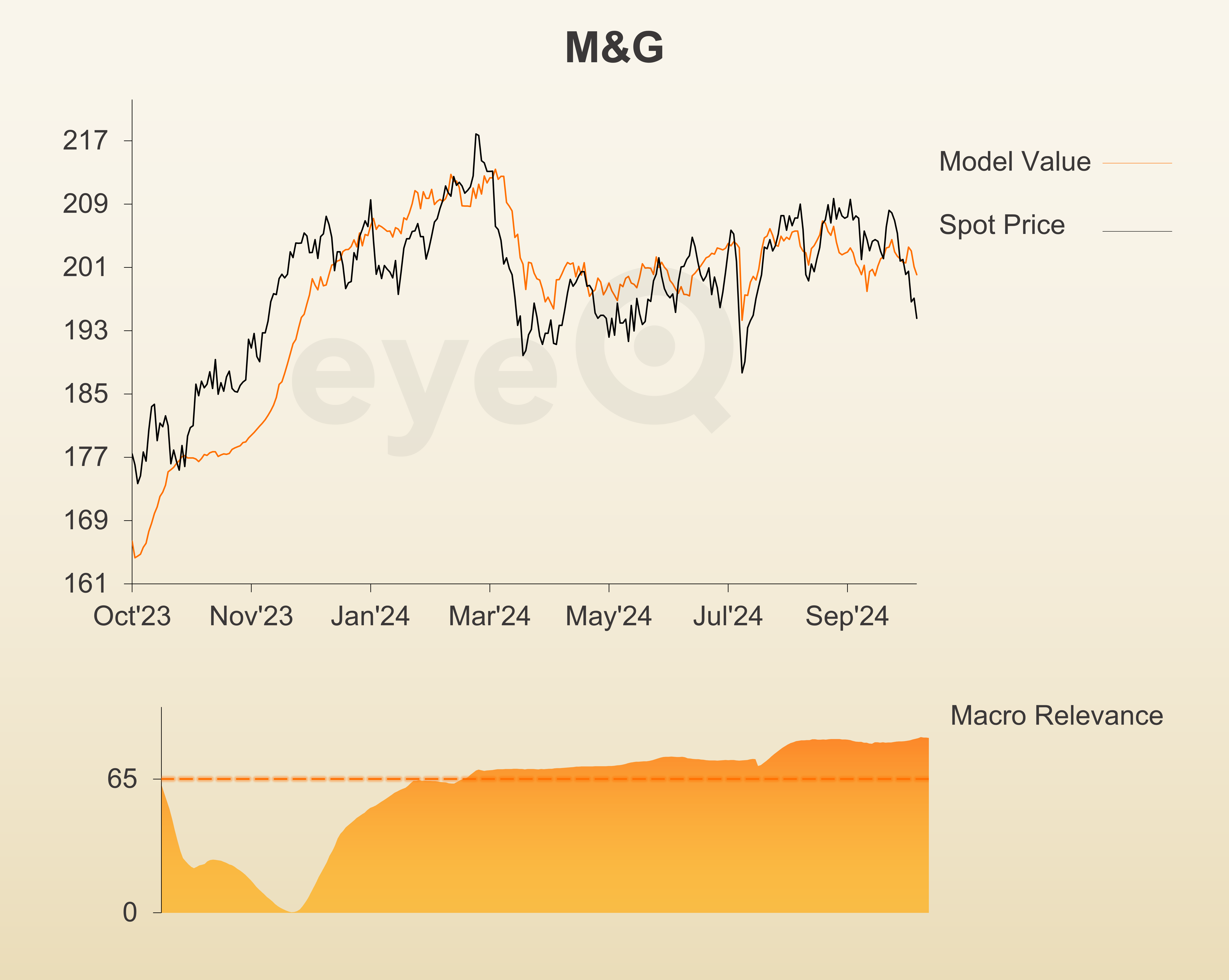eyeQ: what a maths-based smart machine says about M&G shares
Experts at eyeQ have used AI and their own smart machine to analyse macro conditions and generate actionable trading signals. It says things just got interesting at this high-yielding asset manager.
31st October 2024 12:36
by Huw Roberts from eyeQ

"Our signals are crafted through macro-valuation, trend analysis, and meticulous back-testing. This combination ensures a comprehensive evaluation of an asset's value, market conditions, and historical performance." eyeQ
- Discover: eyeQ analysis explained | eyeQ: our smart machine in action | Glossary
M&G
Macro Relevance: 85%
Model Value: 200.47p
Fair Value Gap: -2.73% discount to model value
Data correct as at 31 October 2024. Please click glossary for explanation of terms. Long-term strategic model.
The day after the Budget and the jury is still out. The ultimate arbiter is going to be the bond market - watching how gilt yields behave will be critical. Even if you don’t invest in gilts, remember they determine the cost of money in the real economy more broadly. The interest rates that reflect how much it costs to borrow via mortgages or credit cards feed off yields in the gilt market.
So, while we wait and watch to see how the gilt market settles down and what the Bank of England says about base rates next week, let’s look elsewhere.
The insurer M&G Ordinary Shares (LSE:MNG) was not a macro play last year but it’s been in a regime (model relevance over 65%) since February, and today macro explains 85% of price action. It screens as 2.7% cheap to our model value, which is just shy of the trigger level for a bullish signal.
The stock has sold off around 6.5% since mid-month; eyeQ model value, however, is flatlining. The model shows the stock wants decent economic growth but benign inflation which makes it hostage to any budget fall-out. If gilt yields rise because of inflation fears and that chokes off economic growth, then M&G model value will suffer.
But despite all the scary headlines into the Budget (gilt yields were rising before yesterday, UK inflation expectations have been rising since early September), eyeQ shows model value has been flat.
Mainstream financial commentary will produce headlines; often the scarier the better. Clickbait works. But it’s worth checking a smart machine that employs maths rather than human emotion as one of the inputs to your investment decisions.

Source: eyeQ. Past performance is not a guide to future performance.
Useful terminology:
Model value
Where our smart machine calculates that any stock market index, single stock or exchange-traded fund (ETF) should be priced (the fair value) given the overall macroeconomic environment.
Model (macro) relevance
How confident we are in the model value. The higher the number the better! Above 65% means the macro environment is critical, so any valuation signals carry strong weight. Below 65%, we deem that something other than macro is driving the price.
Fair Value Gap (FVG)
The difference between our model value (fair value) and where the price currently is. A positive Fair Value Gap means the security is above the model value, which we refer to as “rich”. A negative FVG means that it's cheap. The bigger the FVG, the bigger the dislocation and therefore a better entry level for trades.
Long Term model
This model looks at share prices over the last 12 months, captures the company’s relationship with growth, inflation, currency shifts, central bank policy etc and calculates our key results - model value, model relevance, Fair Value Gap.
These third-party research articles are provided by eyeQ (Quant Insight). interactive investor does not make any representation as to the completeness, accuracy or timeliness of the information provided, nor do we accept any liability for any losses, costs, liabilities or expenses that may arise directly or indirectly from your use of, or reliance on, the information (except where we have acted negligently, fraudulently or in wilful default in relation to the production or distribution of the information).
The value of your investments may go down as well as up. You may not get back all the money that you invest.
Equity research is provided for information purposes only. Neither eyeQ (Quant Insight) nor interactive investor have considered your personal circumstances, and the information provided should not be considered a personal recommendation. If you are in any doubt as to the action you should take, please consult an authorised financial adviser.
Disclosure
We use a combination of fundamental and technical analysis in forming our view as to the valuation and prospects of an investment. Where relevant we have set out those particular matters we think are important in the above article, but further detail can be found here.
Please note that our article on this investment should not be considered to be a regular publication.
Details of all recommendations issued by ii during the previous 12-month period can be found here.
ii adheres to a strict code of conduct. Contributors may hold shares or have other interests in companies included in these portfolios, which could create a conflict of interests. Contributors intending to write about any financial instruments in which they have an interest are required to disclose such interest to ii and in the article itself. ii will at all times consider whether such interest impairs the objectivity of the recommendation.
In addition, individuals involved in the production of investment articles are subject to a personal account dealing restriction, which prevents them from placing a transaction in the specified instrument(s) for a period before and for five working days after such publication. This is to avoid personal interests conflicting with the interests of the recipients of those investment articles.